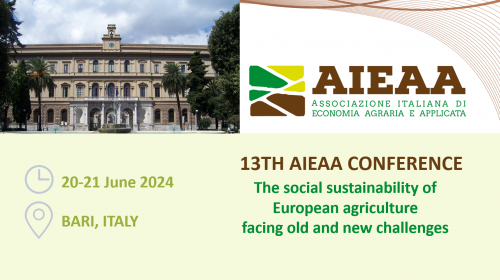On 20-21 June, 2024, SHOWCASE partner University of Bologna (UNIBO) attended the 13th AIEAA Conference "The social sustainability of European agriculture facing old and new challenges.Issues, methods and policies” in Bari, Italy, where Monserrath Lascano and Stefano Targetti presented various project results. The conference addressed the complex and evolving issues within the agricultural sector with the aim to advance discussions on defining and measuring social sustainability, exploring its intersection with environmental and economic dimensions and examining critical issues, such as labour market conditions, demographic changes, migration, and the social impacts of agricultural practices and policies. The event encouraged contributions on policy tools, social innovations and the overall vitality of rural areas.
Monserrath Lascano’s presentation, titled “Designing innovative instruments to enhance farmland biodiversity: a case study analysis from the SHOWCASE project” focused on the urgent need for innovative policy responses to biodiversity conservation, emphasising economic incentives alongside traditional tools like CAP. With the objective to assess biodiversity indicators and integrate them with economic valuation using two case studies from the SHOWCASE project (Spain and Hungary), the team at UNIBO analysed the cost-effectiveness of biodiversity-enhancing policies and spatial modelling differentiated subsidy schemes for farms. Certain possible analytical steps were discussed, such as estimating the costs of different biodiversity policies and analysing the relationship between costs and biodiversity outcomes. This involves cost minimisation and outcome-based target analysis, as well as comparing action-based payments with results-based incentives for biodiversity conservation.
Another partner from UNIBO, namely Stefano Targetti, held a presentation, titled “Result-based schemes: a framework for the assessment of monitoring quality”. The focus of the work presented was a theoretical model that explores how enhanced environmental monitoring can improve the efficiency and acceptability of agri-environmental and climate schemes, addressing critical issues such as the shortcomings in effectiveness, efficiency and innovation capacity of these schemes. Stefano emphasised that a result-based approach can incentivise farmers to maximise biodiversity, although the quality of monitoring and related risks significantly influence farmers' engagement. The findings he presented suggest that achieving optimal biodiversity provision depends on balancing monitoring costs, monitoring quality and the farmers' prior beliefs about their ability to meet biodiversity goals. Future work includes applying the developed model to actual data from SHOWCASE case study areas to validate its theoretical findings.
The presentations from the University of Bologna at the 13th AIEAA Conference highlighted the importance of innovative policy tools and result-based schemes for enhancing farmland biodiversity, emphasising the need for cost-effective, targeted approaches that balance economic incentives with robust monitoring systems to maximise biodiversity outcomes.
Image: Official banner taken from AIEAA's website
